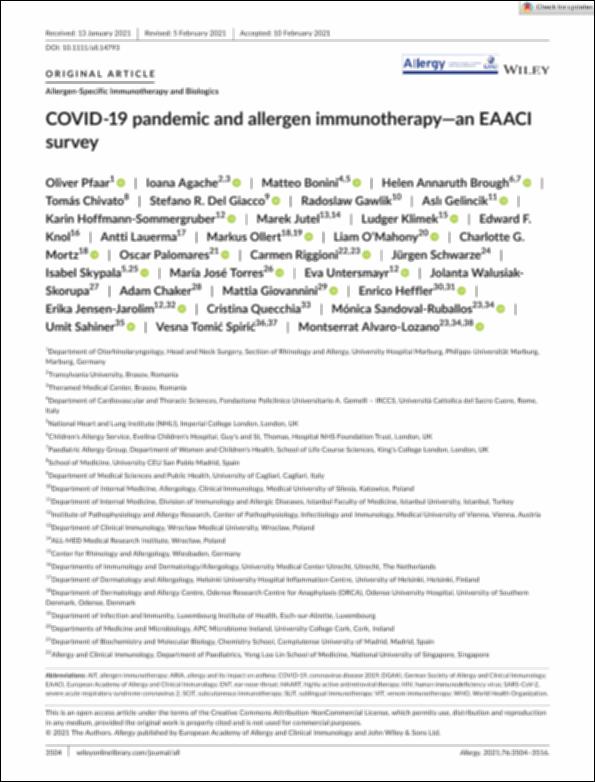Por favor, use este identificador para citar o enlazar este ítem:
http://hdl.handle.net/10637/15143COVID-19 pandemic and allergen immunotherapy—an EAACI survey
| Título : | COVID-19 pandemic and allergen immunotherapy—an EAACI survey |
| Autor : | Pfaar, Oliver Agache, Ioana Bonini, Matteo Brough, Helen Annaruth Chivato Pérez, Tomás Giacco, Stefano del Gawlik, Radoslaw Gelincik, Ash Hoffmann Sommergruber, K. Jutel, Marek Klimek, Ludger Knol, Edward F. Lauerma, Antti Ollert, Markus O'Mahony, Liam Mortz, Charlotte G. Palomares, Oscar Riggioni, Carmen Schwarze, Jürgen Skypala, Isabel Torres, María José Untersmayr, Eva Walusiak Skorupa, Jolanta Chaker, Adam Giovannini, Mattia Heffler, Enrico Jensen Jarolim, Erika Quecchia, Cristina Sandoval Ruballos, Mónica Sahiner, Umit Tomic Spiric, Vesna Álvaro Lozano, Montserrat |
| Materias: | Allergen immunotherapy (AIT); COVID-19; Pandemic; SARS-CoV- 2; Survey |
| Editorial : | Wiley |
| Citación : | Pfaar O, Agache I, Bonini M, et al. COVID-19 pandemic and allergen immunotherapy—an EAACI survey. Allergy. 2021;76:3504–3516. https://doi.org/10.1111/all.14793 |
| Resumen : | Background: As in many fields of medical care, the coronavirus disease 2019 (COVID-19) resulted in an increased uncertainty regarding the safety of allergen immunotherapy (AIT). Therefore, the European Academy of Allergy and Clinical Immunology (EAACI) aimed to analyze the situation in different countries and to systematically collect all information available regarding tolerability and possible amendments in daily practice of sublingual AIT (SLIT), subcutaneous AIT (SCIT) for inhalant allergies and venom AIT. Methods: Under the framework of the EAACI, a panel of experts in the field of AIT coordinated by the Immunotherapy Interest Group set-up a web-basedretrospective survey (SurveyMonkey®) including 27 standardized questions on practical and safety aspects on AIT in worldwide clinical routine. Results: 417 respondents providing AIT to their patients in daily routine answered the survey. For patients (without any current symptoms to suspect COVID-19), 60% of the respondents informed of not having initiated SCIT (40% venom AIT, 35% SLIT) whereas for the maintenance phase of AIT, SCIT was performed by 75% of the respondents (74% venom AIT, 89% SLIT). No tolerability concern arises from this preliminary analysis. 16 physicians reported having performed AIT despite (early) symptoms of COVID-19 and/or a positive test result for severe acute respiratory syndrome coronavirus 2 (SARS-CoV-2). Conclusions: This first international retrospective survey in atopic diseases investigated practical aspects and tolerability of AIT during the COVID-19 pandemic and gave no concerns regarding reduced tolerability under real-life circumstances. However, the data indicate an undertreatment of AIT, which may be temporary, but could have a long-lasting negative impact on the clinical care of allergic patients. |
| URI : | http://hdl.handle.net/10637/15143 |
| Derechos: | http://creativecommons.org/licenses/by-nc-nd/4.0/deed.es OpenAccess |
| ISSN : | 1398-9995 |
| Fecha de publicación : | 2021 |
| Centro : | Universidad San Pablo-CEU |
| Aparece en las colecciones: | Medicina |
Los ítems de DSpace están protegidos por copyright, con todos los derechos reservados, a menos que se indique lo contrario.


